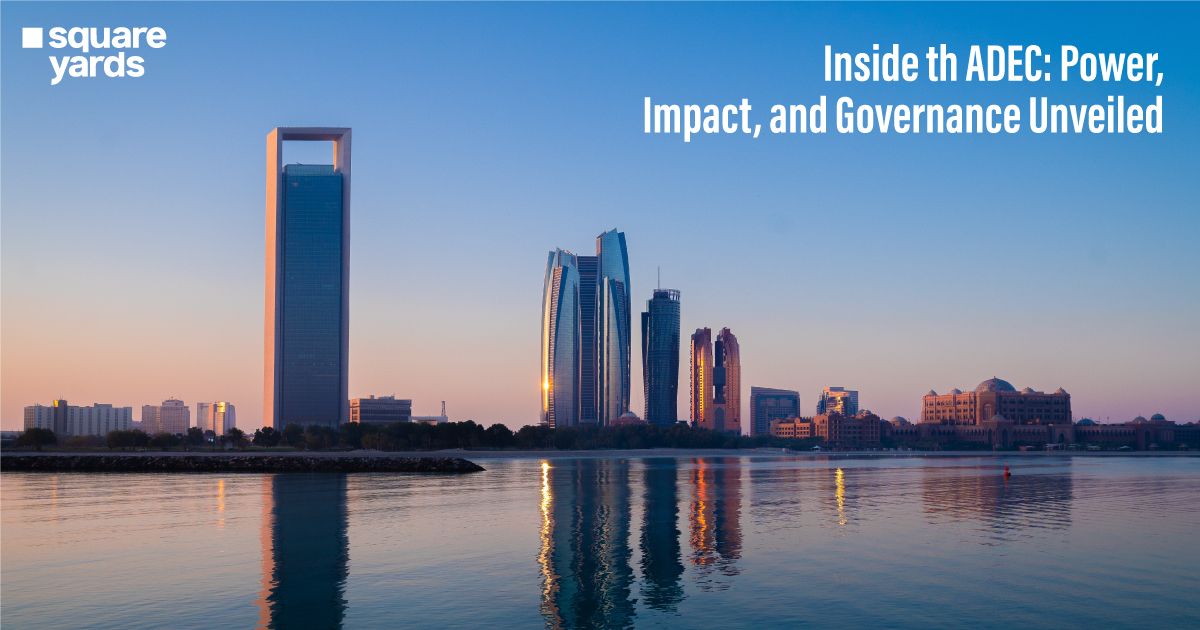Have you ever wondered who steered the Abu Dhabi ship? Imagine a council of influential individuals led by the Crown Prince, who works behind the scenes to drive the emirate’s growth and development. ADEC oversees all government departments and agencies in Abu Dhabi and makes important decisions about economic strategy, legislation, budgeting, and infrastructure projects. Its main objective is to turn Abu Dhabi into a thriving global business, tourism, and culture center. The Abu Dhabi Executive Council members stand out because of their leadership, collaboration, and legacy. Chaired by the Crown Prince, ADEC benefits from a visionary approach, always striving to elevate Abu Dhabi to new heights. The council brings together the brightest minds from various government departments, fostering a collaborative environment that considers every development aspect. Since 1974, its innovative policies have been pivotal in Abu Dhabi’s remarkable journey.
Now, let us get into more detail about ADEC and its functioning.
What Does ADEC Stand For?

The Abu Dhabi Executive Council (ADEC) is a key government body in Abu Dhabi, established in 1974. Highness Sheikh Khaled bin Mohamed bin Zayed Al Nahyan chairs this council. ADEC plays a vital role in the emirate’s development, overseeing policies, projects, and laws that drive economic, social, and cultural growth.
The council ensures effective allocation of strategies and resources, promoting collaboration between the public and private sectors. Setting clear regulations and maintaining rigorous infrastructure creates a stable and transparent environment for real estate and other industries to thrive. From urban planning to smart city initiatives, ADEC is leading the charge in making Abu Dhabi a global hub for business and tourism.
How Does ADEC Assist in Moulding Economic, Social, And Infrastructural Landscape?
The Abu Dhabi Executive Office is a critical agent in determining the development course for the Emirate of Abu Dhabi. Under its leadership, this forum was established in 1974 and became an international business and tourist destination.
-
Economic Impact
To ensure the economy’s growth, ADEC has encouraged global businessmen and investors to invest in Abu Dhabi by creating a suitable business climate and promoting acquisition. The council’s actions, including implementing the Abu Dhabi Economic Vision 2030, will promote expansive and sustainable economic development.
-
Social Development
ADEC’s objectives are to grow Abu Dhabi’s economy, and its mission aligns with improving the lives of people living here. It supervises social development initiatives such as education, healthcare, and communal projects. Smart city projects and similar projects aim to use technology to increase access to public services and quality while reducing emissions and achieving better energy utilisation, thus improving living standards.
-
Infrastructural Advancements
Infrastructural development is one of the key areas of operation for the Abu Dhabi Executive Council Board of Directors. The council is ultimately responsible for starting and overseeing new projects that enhance the emirate’s physical environment, namely roads and other public facilities or growing transportation channels.
-
Cultural Enrichment
It also serves as an advisor to preserve and promote Abu Dhabi’s cultural heritage. In addition, by embracing cultural policies and projects such as the Dar Al Kitab that preserve the emirate’s civilisational heritage, ADEC plays a vital role in leading the way in cultural tourism and pride amongst the communities.
Functions And Duties of Abu Dhabi Executive Council

The Abu Dhabi Executive Council is a pillar of the emirate’s government, with a wide range of functions and responsibilities that work together to ensure smooth operation and development.
Some of the roles and responsibilities of Abu Dhabi Executive Council are as follows—
-
Regulatory Framework
The Abu Dhabi Executive Office is crucial in establishing and maintaining a robust regulatory framework for the emirate’s real estate market, ensuring transparency, efficiency, and fairness.
-
- Property Ownership and Transfer– Abu Dhabi Executive Council sets clear rules for property ownership and transfer, ensuring legal and transparent transactions that protect all stakeholders.
- Lease Agreements– The council oversees lease agreements, setting fair standards for rental contracts to maintain a balanced market and prevent disputes.
- Sustainable Transactions—ADEC promotes sustainable real estate transactions by enforcing regulations that ensure transparency, efficiency, and trust in the market.
- Compliance and Enforcement– ADEC ensures compliance with real estate regulations by enforcing rules and acting against violations to protect market integrity.
- Adaptability and Innovation– The council continuously updates its regulatory framework to address new challenges and opportunities, fostering a resilient real estate sector.
- Stakeholder Engagement—ADEC collaborates with developers, investors, and residents to refine regulations and ensure they comprehensively meet market needs.
-
Infrastructure Development
The Abu Dhabi Executive Council members are also responsible for formulating and implementing the framework of infrastructural development. The plans include the construction of roads, social amenities, and transportation systems. These interventions are important given the population growth that demands infrastructure and supports economic development in Abu Dhabi.
The strategic development plans of the ADEC guarantee that the infrastructure necessary for sustainable economic growth is vital to the vitalisation of the emirate and the improvement of its residents’ quality of life. With strategic planning and efficient and proper execution, ADEC plays an important role in overhauling Abu Dhabi into a premier destination for business and tourism, which aligns with its role as a city that is always moving forward.
-
Urban Planning
The council develops long-term plans and zoning laws that dictate land use patterns, building density, and construction guidelines. This strategic planning ensures that Abu Dhabi’s urban landscape is sustainable and organised.
-
Public-Private Partnerships
ADEC fosters collaboration between the public and private sectors through public-private partnerships. These partnerships are instrumental in driving economic growth and innovation. A notable example is the recent framework approved by the Abu Dhabi government and Aldar Properties, a leading local developer.
-
Social Development Initiatives
The Abu Dhabi Executive Council Board is focused on economic and infrastructural development and improving the quality of life for residents. This includes efforts in education, healthcare, and community services. ADEC’s smart city projects use technology to enhance public services, reduce emissions, and promote sustainability. ADEC’s focus on these areas ensures that all citizens of Abu Dhabi benefit from the city’s growth, creating a thriving, sustainable, and inclusive community.
-
Setting Up Policies
ADEC is responsible for setting policies that guide the emirate’s economic, social, and cultural development. The council’s policies are crafted to meet the diverse needs of stakeholders, fostering sustainable growth across various sectors. By promoting collaboration between public and private entities, ADEC creates a robust framework that supports Abu Dhabi’s continued progress as a global hub for business and tourism.
-
Project Oversight
The council oversees major development projects, ensuring they align with the emirate’s strategic vision. This includes real estate projects, infrastructure improvements, and urban development initiatives. ADEC’s oversight ensures that projects are completed efficiently and meet the highest standards.
How Are Members of ADEC Selected?
The selection process for the Abu Dhabi Executive Council members is a carefully considered procedure to ensure that the council comprises individuals with the expertise, experience, and vision necessary to guide the emirate’s development.
-
-
Appointment by the Ruler
-
The ruler of Abu Dhabi appoints the members. Recruitment is often done after considering candidates with exemplary leadership qualities and knowledge of the emirate’s economic, social, and cultural context.
-
-
Criteria for Selection
-
Potential members are chosen based on their expertise in various fields. These areas include economics, urban planning, infrastructure development, and public administration.
-
-
Leadership Roles
-
Leadership positions in ADEC are often held by high-ranking members of the ruling family or senior government officials. For instance, His Highness Sheikh Khaled bin Mohamed bin Zayed Al Nahyan is the chairman of ADEC, bringing his vision and leadership to the council.
-
-
Advisory Roles
-
The council may also have advisors and experts. These permanent members provide technical knowledge on specific issues.
-
-
Regular Review
-
As for the composition of ADEC, it is changing from time to time to address the emerging concerns of the council as related to the requirements of Abu Dhabi. This means that the board’s membership can be adjusted, new board members can be brought in if necessary, or old ones can be replaced where deemed suitable.
The Reporting Hierarchy Within Abu Dhabi Executive Council
The Abu Dhabi Executive Council Board of Directors has a structured reporting hierarchy that ensures smooth governance and accountability.
-
-
Chairman
-
The Abu Dhabi Executive Council Chairman, highness Sheikh Khaled bin Mohamed bin Zayed Al Nahyan, is at the top. He provides leadership and direction and ensures all initiatives align with Abu Dhabi’s strategic goals.
-
-
Council Members
-
The ruler of Abu Dhabi appoints the council members, who report directly to the chairman. The council oversees economic development, infrastructure, urban planning, and social services and works together to drive the emirate’s growth.
-
-
Subcommittees
-
ADEC may form subcommittees to focus on specific issues. These groups, comprising council members and appointed experts, report their findings and recommendations to the full council, ensuring detailed attention to key areas.
-
-
Advisors and Experts
-
Specialised advisors and experts offer insights and recommendations. It is vital in informing decisions without having direct decision-making authority.
-
-
Administrative Support
-
A team of administrative staff supports the council and advisors. They organise meetings, prepare documents, and ensures effective communication.
-
-
Implementation Agencies
-
After decisions are made, various government agencies and departments implement them. These agencies report to ADEC on progress and outcomes, ensuring the council’s directives and goals are followed.
Wrapping It Up
The role of the Abu Dhabi Executive Council is crucial in building the emirate’s future vision and framework. ADEC’s development and implementation of partnerships between the public and private sectors efficiently drive sustainable growth and development. Consequently, the implementation helps achieve the goals of keeping the Emirates a competitive global destination for businesses and tourism with better living standards for the residents.
Similar Suggestions For You:
|
Explore TAMM Abu Dhabi |
|
|
HAAD License Abu Dhabi |
|
|
Need to Understand High Water Bill Causes |
|
|
Al Ain Distribution Company (AADC) |
|
|
Activate Abu Dhabi Water and Electricity Authority |
Frequently Asked Questions(FAQ’s):
His Highness Sheikh Khaled bin Mohamed bin Zayed Al Nahyan is the head of the Abu Dhabi Executive Council and the organisation's chairman.
The Abu Dhabi Executive Council focuses on the emirate's development, while the UAE's federal government addresses nationwide issues.
Yes, ADEC attracts foreign investment to Abu Dhabi by creating a business-friendly environment, implementing investment-friendly policies, and fostering public-private partnerships.
ADEC sets policy effectiveness through regular reviews, performance metrics, and stakeholder feedback. They monitor project progress and outcomes to ensure alignment with strategic goals and make necessary adjustments.
ADEC faces challenges like sustaining growth, meeting the needs of a growing population, innovating in smart city development and environmental sustainability, and balancing rapid development with preserving cultural heritage. Who is the head of the Abu Dhabi Executive Council?
How does the Abu Dhabi Executive Council differ from the UAE's federal government?
Does ADEC play a role in attracting foreign investment to Abu Dhabi?
How does ADEC measure the effectiveness of its policies and initiatives?
What are some of the biggest challenges facing the Abu Dhabi Executive Council in the coming years?




